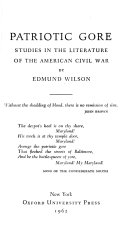
Patriotic Gore: Studies in the Literature of The American Civil War PDF
816 Pages·1962·91.8157 MB·other
Most books are stored in the elastic cloud where traffic is expensive. For this reason, we have a limit on daily download.
Preview Patriotic Gore: Studies in the Literature of The American Civil War
Description:
In his introduction to Patriotic Gore, Edmund Wilson asks, 'Has there ever been another historical crisis of the magnitude of 1861-1865 in which so many people were so articulate?' Regarded by many critics as Wilson's greatest book, Patriotic Gore more than proves the point, brilliantly portraying the vast political, spiritual, and material crisis of the Civil War as reflected in the lives and writings of some thirty representative Americans.
https://en.wikipedia.org/wiki/Patriotic_Gore Includes material on Harriet Beecher Stowe and Uncle Tom's cabin, the Battle hymn of the Republic, Abraham Lincoln, Ulysses S. Grant, William T. Sherman, Frederick L. Olmstead; Mary Chesnut, John S. Mosby, Robert E. Lee, Alexander H. Stephens, Sidney Lanier, Albion W. Tourgee, George W. Cable, Kate Chopin, Thomas Nelson Page, Ambrose Bierce, and Justice Oliver Wendell Holmes, among others.Contents:
Harriet Beecher Stowe --
Calvin Stowe; Francis Grierson; The battle hymn of the republic; The union as religious mysticism --
Abraham Lincoln --
Northern soldiers: Ulysses S. Grant --
Northern soldiers: William T. Sherman --
Northerners in the South: Frederick L. Olmsted, John T. Trowbridge --
Northerners in the South: Charlotte Forten and Colonel Higginson --
Three Confederate ladies: Kate Stone, Sarah Morgan, Mary Chesnut --
Southern soldiers: Richard Taylor, John S. Mosby, Robert E. Lee --
Diversity of opinion in the South: William J. Grayson, George Fitzhugh, Hilton R. Helper --
Alexander H. Stephens --
The myth of the old South; Sidney Lanier; Poetry of the Civil War; Sut Lovingood --
Novelists of the post-war South: Albion Tourge´e, George W. Cable, Kate Chopin, Thomas Nelson --
Ambrose Bierce on the Owl Creek Bridge --
The chastening of American prose style; John W. De Forest --
Justice Oliver Wendell Holmes.
https://en.wikipedia.org/wiki/Patriotic_Gore Includes material on Harriet Beecher Stowe and Uncle Tom's cabin, the Battle hymn of the Republic, Abraham Lincoln, Ulysses S. Grant, William T. Sherman, Frederick L. Olmstead; Mary Chesnut, John S. Mosby, Robert E. Lee, Alexander H. Stephens, Sidney Lanier, Albion W. Tourgee, George W. Cable, Kate Chopin, Thomas Nelson Page, Ambrose Bierce, and Justice Oliver Wendell Holmes, among others.Contents:
Harriet Beecher Stowe --
Calvin Stowe; Francis Grierson; The battle hymn of the republic; The union as religious mysticism --
Abraham Lincoln --
Northern soldiers: Ulysses S. Grant --
Northern soldiers: William T. Sherman --
Northerners in the South: Frederick L. Olmsted, John T. Trowbridge --
Northerners in the South: Charlotte Forten and Colonel Higginson --
Three Confederate ladies: Kate Stone, Sarah Morgan, Mary Chesnut --
Southern soldiers: Richard Taylor, John S. Mosby, Robert E. Lee --
Diversity of opinion in the South: William J. Grayson, George Fitzhugh, Hilton R. Helper --
Alexander H. Stephens --
The myth of the old South; Sidney Lanier; Poetry of the Civil War; Sut Lovingood --
Novelists of the post-war South: Albion Tourge´e, George W. Cable, Kate Chopin, Thomas Nelson --
Ambrose Bierce on the Owl Creek Bridge --
The chastening of American prose style; John W. De Forest --
Justice Oliver Wendell Holmes.
See more
The list of books you might like
Most books are stored in the elastic cloud where traffic is expensive. For this reason, we have a limit on daily download.
